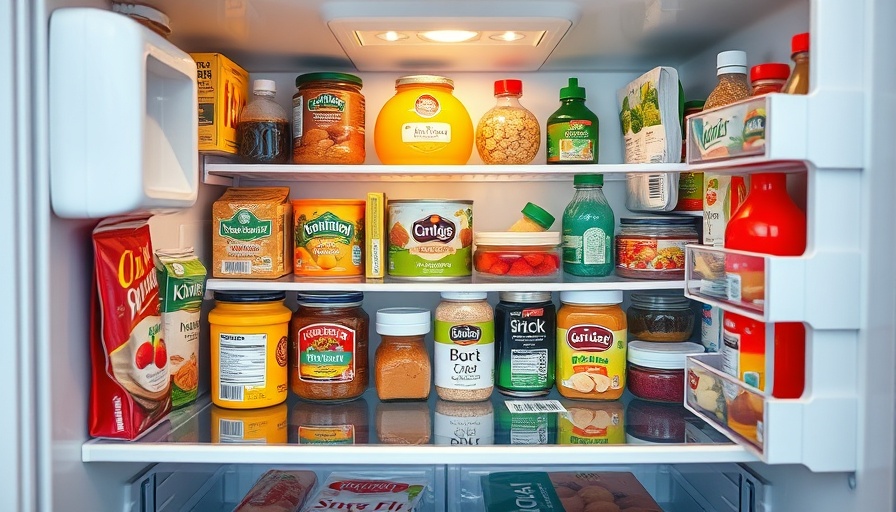
The Rising Tide of Food Recalls: What Homeowners Need to Know
In 2024, the food industry faced a tumultuous year that left consumers uneasy about the safety of their meals. With nearly 1,400 people falling ill due to recalled products, families in the MidSouth and beyond became acutely aware of the fragility of our food safety system. High-profile recalls linked to harmful pathogens like Listeria, Salmonella, and E. coli forced them to scrutinize the very foods they once took for granted, revealing the underlying vulnerabilities that can impact their health.
Understanding the Triggers of Recalls
With food safety increasingly entering households' discussions, let’s delve into the key factors that ignited the food recall crises of 2024. Understanding these causes can empower homeowners to make safer choices when it comes to their families’ meals.
Pathogen Contamination: The Silent Threat
The primary antagonist in the wave of recalls was pathogen contamination. Scares from Listeria, renowned for its severe consequences, accounted for a staggering 22% of foodborne illnesses last year.
For example, the infamous Boar's Head Deli meats recall led to 60 hospitalizations and 10 deaths, casting a shadow over what many believed to be safe food sources. Likewise, Salmonella was linked to the contamination of fresh produce, specifically cucumbers from Fresh Start Produce, affecting 551 people across 34 states—an alarming reminder of how widespread consequences can stem from a single source.
E. coli was not to be left out of the detrimental narrative of food safety, as significant outbreaks, including a widely publicized incident involving McDonald's, remined consumers of the potential dangers of contaminated ground beef and fresh vegetables.
Undeclared Allergens: A Hidden Hazard
Another pressing concern is undeclared allergens which prompted 34% of all recalls in 2024. Common troublemakers such as peanuts and dairy can show up unexpectedly in packaged foods without proper labeling, leading to severe allergic reactions. In a community that strives for well-being, the responsibility lies with food producers to improve labeling practices.
Toxic Contaminants and Foreign Materials: Beyond Biological Threats
When speaking of food safety, it’s essential not to ignore toxic contaminants like excessive lead or foreign materials such as plastic and metal. These uninvited guests join the ranks of hazardous foodborne pathogens, highlighting that food safety assurance is an ongoing battle that involves endless vigilance.
The Emotional Toll of Food Recalls
Food recalls not only disrupt health but also weave uncertainty into the fabric of our lives. Families across the MidSouth often sit at the dinner table, now questioning every bite. This psychological impact underpins the broader ramifications of food safety crises. It’s not just about the potential for illness; it’s about trust in what we consume.
Rebuilding Trust: Steps for Homeowners
In the wake of such alarming revelations, how can homeowners in the MidSouth take action to safeguard their families? Here are some practical tips to consider:
- Stay Informed: Keep tabs on food recalls via local news, FDA announcements, and health department reports. Homeowners can also follow specific brands on social media to receive timely updates.
- Read Labels: Always check for allergen information, even if a product appears familiar. Label vigilance is key in more ways than one.
- Know Your Sources: Purchase from trustworthy vendors and local markets when possible. Knowing the source of your products can add an extra level of reassurance.
- Practice Safe Food Habits: Ensure proper food storage and cooking methods to mitigate the risks associated with contamination.
Conclusion: Taking Control of Food Safety
As we've seen, the food industry has permeated our homes with vulnerabilities that can compromise our health. However, by remaining informed and proactive, homeowners can combat potential issues before they arise. Trust your instincts; your family’s well-being is worth the extra effort. Taking action now means not only protecting your loved ones from the pitfalls of food safety crises but also advocating for a clearer, safer food supply chain. Let's work together towards a healthier future!
 Add Row
Add Row  Add
Add 



 Add Row
Add Row  Add
Add 
Write A Comment